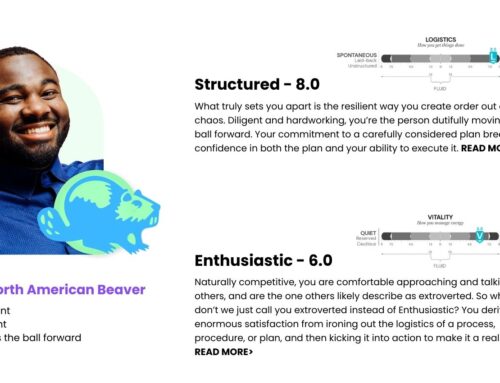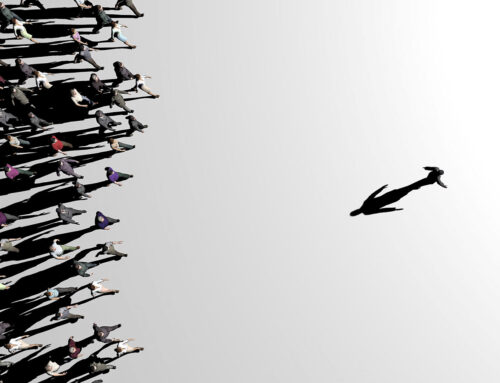Why Voters Are Under the Influence
In 1960 just 4% of Democrats and Republicans admitted they’d be upset if their child married someone with opposing political views. By 2018, that figure had risen to 45% of Democrats and 35% of Republicans.
What happened? How did such a massive schism come to separate the American electorate?
Howard Lavine, who directs the Inter-university Consortium for Political and Social Research, lays the blame squarely on what he calls “the monster” of party identification.
So while external influences – e.g. biased reporting, foreign meddlers, social media, etc. – can indeed exacerbate this problem, it’s our blind allegiance to a political party that makes us susceptible to these influences in the first place.
More open-minded, independent voters, meanwhile, neither fall for these nefarious influences nor add to the divide (though they certainly can suffer from its effects).
The good news is that the political divide can be bridged, our tolerance for opposing perspectives increased, and our stress levels decreased. But only if we’re willing to explore what’s really going on inside each of us.
I Pledge Allegiance to….
In 1979 psychologists Henri Tajfel and John Turner introduced the idea of social identity theory. As the label suggests, it means our identity can easily get tied up with any groups to which we belong. (Recall those high school cliques?)
According to Tajfel and Turner, this unfolds in three stages:
- Categorization – A big part of the brain’s job is to categorize objects to make sense of the world around it. Apples are classified by color, size, taste, etc., while humans are classified by gender, size, skin color, etc. The brain associates us with some groups but not others. So far, so good, just the brain doing brain stuff.
- Social Identification – Here is where things can get messier, because we may transition from simple membership in a group to identification with it. It is one thing for a male mind to recognize it does not belong to the female persuasion, quite another to take pride in being a male and offense when it feels as if males are under attack (usually a perception vs a reality).
- Social Comparison – Here is where things can turn ugly, because once our sense of self is tied up with a group, its becomes our status. We live and die with the fortunes of a favorite sports team, for example, believe our gender or race is smarter, our nation superior, and so on. Here is where prejudice of all kinds is born, and it is the offspring of all humans, not just some.
This is where the ‘blindness’ kicks in. Lost in our identification with the group, we cherry-pick information that supports our party’s position and reject anything that runs contrary to it. And this process plays out equally with Democrats and Republicans (they’re all human, after all).
The First Step is Admitting You Have a Problem
If you’re weary of the divisions and the stresses that come with it, the first step is to recognize you have a problem. And then to do something about it.
For starters, realize that if you feel genuine stress at the fortunes of your political party, you are indeed unduly influenced by your identification with that party. Whether your candidate is winning and you feel jubilant or he’s losing and you feel defeated, there are unexamined forces are at work within you.
Work on separating yourself from identification with the party. This doesn’t mean you can’t still agree with important parts of its platform, but recognize that the differences between members of the two parties are far smaller than most recognize (the video below can help in that process).
Next, begin the process of educating yourself about yourself. If you’ve already taken our free ALIVE Big 5 personality assessment, then you’re familiar with your dominant personality traits. Why does this matter?
Because research shows that if you are more Logistical or Practical, you very likely lean Right; and if you’re more Spontaneous and Imaginative, you probably lean Left. Again, unseen forces are at work and likely prompting your affiliation with a party.
The good news: once we borrow a page from Socrates’s playbook and begin to live an examined life, we may just recognize a blind identification with any group isn’t good for us – or our those around us.
Why Voters Are Under the Influence
In 1960 just 4% of Democrats and Republicans admitted they’d be upset if their child married someone with opposing political views. By 2018, that figure had risen to 45% of Democrats and 35% of Republicans.
What happened? How did such a massive schism come to separate the American electorate?
Howard Lavine, who directs the Inter-university Consortium for Political and Social Research, lays the blame squarely on what he calls “the monster” of party identification.
So while external influences – e.g. biased reporting, foreign meddlers, social media, etc. – can indeed exacerbate this problem, it’s our blind allegiance to a political party that makes us susceptible to these influences in the first place.
More open-minded, independent voters, meanwhile, neither fall for these nefarious influences nor add to the divide (though they certainly can suffer from its effects).
The good news is that the political divide can be bridged, our tolerance for opposing perspectives increased, and our stress levels decreased. But only if we’re willing to explore what’s really going on inside each of us.
I Pledge Allegiance to….
In 1979 psychologists Henri Tajfel and John Turner introduced the idea of social identity theory. As the label suggests, it means our identity can easily get tied up with any groups to which we belong. (Recall those high school cliques?)
According to Tajfel and Turner, this unfolds in three stages:
- Categorization – A big part of the brain’s job is to categorize objects to make sense of the world around it. Apples are classified by color, size, taste, etc., while humans are classified by gender, size, skin color, etc. The brain associates us with some groups but not others. So far, so good, just the brain doing brain stuff.
- Social Identification – Here is where things can get messier, because we may transition from simple membership in a group to identification with it. It is one thing for a male mind to recognize it does not belong to the female persuasion, quite another to take pride in being a male and offense when it feels as if males are under attack (usually a perception vs a reality).
- Social Comparison – Here is where things can turn ugly, because once our sense of self is tied up with a group, its becomes our status. We live and die with the fortunes of a favorite sports team, for example, believe our gender or race is smarter, our nation superior, and so on. Here is where prejudice of all kinds is born, and it is the offspring of all humans, not just some.
This is where the ‘blindness’ kicks in. Lost in our identification with the group, we cherry-pick information that supports our party’s position and reject anything that runs contrary to it. And this process plays out equally with Democrats and Republicans (they’re all human, after all).
The First Step is Admitting You Have a Problem
If you’re weary of the divisions and the stresses that come with it, the first step is to recognize you have a problem. And then to do something about it.
For starters, realize that if you feel genuine stress at the fortunes of your political party, you are indeed unduly influenced by your identification with that party. Whether your candidate is winning and you feel jubilant or he’s losing and you feel defeated, there are unexamined forces are at work within you.
Work on separating yourself from identification with the party. This doesn’t mean you can’t still agree with important parts of its platform, but recognize that the differences between members of the two parties are far smaller than most recognize (the video below can help in that process).
Next, begin the process of educating yourself about yourself. If you’ve already taken our free ALIVE Big 5 personality assessment, then you’re familiar with your dominant personality traits. Why does this matter?
Because research shows that if you are more Logistical or Practical, you very likely lean Right; and if you’re more Spontaneous and Imaginative, you probably lean Left. Again, unseen forces are at work and likely prompting your affiliation with a party.
The good news: once we borrow a page from Socrates’s playbook and begin to live an examined life, we may just recognize a blind identification with any group isn’t good for us – or our those around us.



